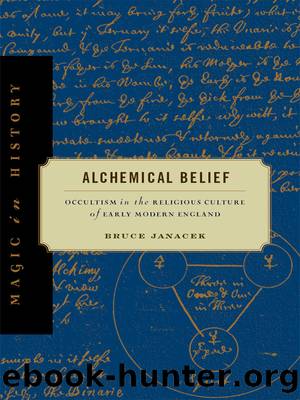Alchemical Belief by Janacek Bruce

Author:Janacek, Bruce
Language: eng
Format: epub
ISBN: 978-0-271-05013-3
Publisher: Pennsylvania State University Press
Published: 2011-08-25T16:00:00+00:00
Clearly the treatise on the soul could not be understood without a firm grasp of the physical principles of the mechanical philosophy.
Digbyâs religious beliefs played a prominent role in the argument of the Two Treatises. He believed that the immortal soul could and indeed must be understood by natural philosophical principles if individuals, particularly non-Catholics, were to accept his arguments.57 Although his concerns were not uniquely CatholicâProtestant natural philosophers shared themâhe had to frame his argument in such a way that it would be acceptable to his mostly Protestant audience. This strategy did not mean that he distanced himself from his faith when it became inconvenient, but it begins to explain why he wanted to integrate his religious argument into the principles of natural philosophy. His goal was to build a bridge between the two confessions.
The Fifth Lateran Council in 1513 had established the immortality of the soul as official Catholic dogma. In an almost haunting anticipation of Luther a few years later, the council asked that Christian philosophers ââuse all of their powersâ to demonstrate that the immortality of the soul can be understood by natural reason and not by faith alone.â58 Digby and his Catholic circle were engaged in discussion of this and related issues. Pierre Gassendi in particular sought to resolve the troubling theological implications of the mechanical philosophy.59
Digby and his cohorts saw the Two Treatises as an answer to the theological problem that confronted them in Paris in the 1630s and 1640s. Aquinasâs four-hundred-year-old synthesis of Aristotle and Christianity had largely identified the role of God in Aristotelian physics. If Aristotelianism was to be replaced by mechanism, then the role of God had to be clarified once more. Yet Digbyâs philosophy of the soul, as expressed in the Two Treatises, was planted firmly in the soil of Aristotelianism. Aristotleâs De anima opens with the statement that âthe soul is, so to speak, the first principle of living things. We seek to contemplate and know its nature and substance and then the things that are accidental to it.â60 Like Aristotle, Digby believed that the soul was âthe first principle of living things.â It was an âordererâ that could direct itself through its own volition and also communicate its dicta to order other things. Like matter, the soul was subject to motion, but unlike matter the soul could âcommunicate it unto such thinges, as are to be ordered.â He was satisfied that he had demonstrated the soulâs intelligence and, especially, its free will: âthen, sithence ordering is motion, it followeth evidently, that the soule is a moover and a beginner of motion.â61 His belief that the soul could communicate its will to material bodies was an implicit statement that individuals had free will. If the soul could not communicate its will to move matter or bodies, then free will was not possibleâa position he explicitly rejected.
To Puritan ears, Digbyâs language was incendiary. England was in the midst of a civil war ignited in part, some have argued, by the very issue of free will.
Download
This site does not store any files on its server. We only index and link to content provided by other sites. Please contact the content providers to delete copyright contents if any and email us, we'll remove relevant links or contents immediately.
| Africa | Americas |
| Arctic & Antarctica | Asia |
| Australia & Oceania | Europe |
| Middle East | Russia |
| United States | World |
| Ancient Civilizations | Military |
| Historical Study & Educational Resources |
Magic and Divination in Early Islam by Emilie Savage-Smith;(1530)
Papillon by Henry Charrière(1418)
Bohemians, Bootleggers, Flappers, and Swells: The Best of Early Vanity Fair by Bohemians Bootleggers Flappers & Swells- The Best of Early Vanity Fair (epub)(1394)
Ambition and Desire: The Dangerous Life of Josephine Bonaparte by Kate Williams(1380)
Twelve Caesars by Mary Beard(1310)
Operation Vengeance: The Astonishing Aerial Ambush That Changed World War II by Dan Hampton(1155)
What Really Happened: The Death of Hitler by Robert J. Hutchinson(1154)
London in the Twentieth Century by Jerry White(1141)
The Japanese by Christopher Harding(1129)
Time of the Magicians by Wolfram Eilenberger(1125)
Twilight of the Gods by Ian W. Toll(1110)
Lenin: A Biography by Robert Service(1071)
The Devil You Know by Charles M. Blow(1019)
A Social History of the Media by Peter Burke & Peter Burke(966)
Freemasons for Dummies by Hodapp Christopher;(960)
Napolean Hill Collection by Napoleon Hill(936)
Henry III by David Carpenter;(919)
The Churchill Complex by Ian Buruma(906)
The Rise and Triumph of the Modern Self by Unknown(904)
